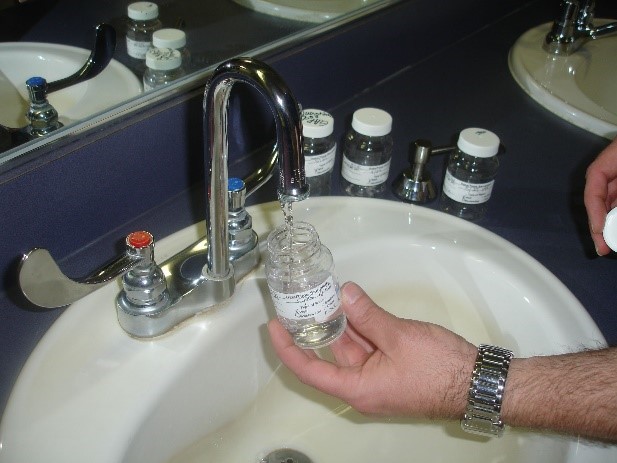In recent years, lead in water has made headlines across the nation. Lead is harmful when too much is ingested, because it builds up in the body until it reaches toxic levels. Lead damages the brain, nervous system, kidneys, reproductive system, and red blood cells. It is more toxic to children than to adults, and it can harm their mental and physical development.
The source waters for most public water systems in south Georgia (and some in north Georgia) are also supplied by groundwater. Generally, lead and copper concentrations in the major underground aquifers in Georgia are far below the U.S. Environmental Protection Agency’s (EPA) action levels. They enter the household drinking water system and exceed the action levels almost exclusively via corrosion of plumbing materials. Many homes built prior to the 1988 still have lead solder connecting copper pipes, unless later on replaced by PVC pipes. Also, indoor plumbing fixtures are often made of lead and copper or their alloys, such as brass. Corrosive water can dissolve small amounts of these metals from plumbing which, upon drinking, may be harmful to your health. In 1992, the lead and copper rule, published by the EPA, became effective and required that municipal water suppliers must treat water to reduce concentrations below action levels of 0.015 milligrams (mg) lead per liter or 15 parts per billion (ppb) and 1.3 mg copper per liter or 1.3 parts per million (ppm). Keep in mind, however, that the EPA does not regulate private water supplies (such as well water), nor can the EPA control the lead and copper contamination that may result from your household pipes.
Though Paulding County Water monitors and regulates water quality for municipal water for our county, they are not responsible for sources of lead or copper on a homeowner’s side of the water line-meaning your plumbing and fixtures are your responsibility. Recently, we have heard from Paulding County Water and local residents with homes built before 1988 that some of these homes may need to monitor their water for lead.

I often talk with homeowners who have questions about their well water and its safety and more often now, I am hearing from municipal water clients with concerns about the quality of their drinking water. Many of them say, “Well it tastes fine and it smells fine.” Although taste, odor and appearance of your drinking water can give you an indication of its quality, those characteristics are not a definite indicator if the water is really safe or unsafe to drink. Contaminated water can taste and smell fine, whereas unpleasant-tasting or -smelling water can be safe to drink or use. Many drinking water problems can only be detected through laboratory testing of the water.
You should consider water testing for lead if:
- You have a home built before 1988 that may have plumbing or fixtures that contain lead.
- You are concerned about the lead pipes or soldering in your home.
UGA Extension Agricultural and Environmental Sciences Lab in Athens can provide testing for lead in both well water and water from homes supplied by municipal water, that may have lead in plumbing fixtures. The fee for a lead test in water is $45. For Lead a first draw water sample will be collected after a minimum of 6 hours, but not more than 12 hours, period during which time there was no water usage prior to the sampling. You should collect a sample from the kitchen faucet or the faucet used most often for drinking. Take samples from the first flush of water that comes from the faucet. Bring about 16 oz of water to the Paulding County UGA Extension office. Our office accepts cash, check, or Visa/Mastercard for the associated fees.
Unfortunately, no single test provides information about all of the possible contaminants in water, but Paulding County UGA Extension does offer other water testing and we can consult with you regarding water quality questions that may arise. Water samples are tested through the UGA Agricultural and Environmental Services Laboratory in Athens. Fees and sampling procedures vary based on the test, so consult with the Extension Office for specific information.
The author of this article, Mary Carol Sheffield, is the Paulding County Extension Coordinator and Agent for Agriculture and Natural Resources. For more information on well water testing, sampling procedures and testing fees through Paulding County UGA Extension, contact the Paulding County Cooperative Extension Office at 770-443-7616 or check us out online at www.ugaextension.org/paulding.